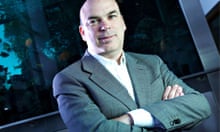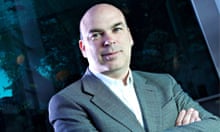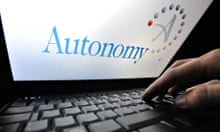Autonomy's former finance director has accused Hewlett-Packard of making unsubstantiated allegations of fraud to cover its own blunders in the $11bn (£6.5bn) takeover of the British software firm.
Sushovan Hussain, who along with Autonomy's founder, Mike Lynch, has been labelled a "fraudster" by HP – a claim which both men deny – oversaw the sale of his firm for 11 times its $931m revenues in August 2011. A year later, HP wrote down the value of Autonomy by $9.9bn, $5bn of which it attributed to alleged accounting improprieties at the British group.
Hussain used a court filing on Tuesday to accuse HP of destroying value by mismanaging the newly acquired company, but also cited commentators suggesting it had overpaid in the first place.
Hussain quoted a Bloomberg article of November 2012, in which the columnist Jonathan Weil claimed: "The real story here is that HP grossly overpaid – again – for an acquisition ... In other words: HP was the sucker. Now it's trying to shift the blame elsewhere."
Hussain also referred to comments by Lynn Turner, a former chief accountant at America's financial regulator, the Securities and Exchange Commission, who argued: "The big issue isn't the fraud they are talking about. The big issue is that HP has made acquisitions that have turned out to be a disaster."
The architect of the deal, HP chief executive Léo Apotheker, lost his job after just 11 months amid a storm of criticism from shareholders. He was succeeded by Meg Whitman, the former eBay boss, who approved the acquisition in her previous role as a non-executive director of HP.
HP shareholders had been suing the HP management for wasting cash on the botched acquisition but agreed in a recent settlement to switch their focus to supporting the company against Autonomy.
Referring to that deal Hussain's filing said: "This corrupt settlement is part of a larger effort by HP to cover up both its mismanagement of the Autonomy integration and its ploy to falsely accuse others. By his motion, Mr. Hussain seeks to shine a light on what HP wants to keep in the dark."
Hewlett-Packard responded: "The bottom line is that Sushovan Hussain's interests and those of HP and our shareholders are diametrically opposed. It's preposterous for him to complain about HP and our shareholders joining forces and holding him accountable for the massive fraud that both believe he perpetrated upon the company. If Hussain is truly interested in clearing his name, he should welcome the coming suit."
A judge in the district court of Northern California is due to ratify the settlement between HP and its shareholders on 25 August. Hussain has accused the law firms concerned, Cotchett, Pitre & McCarthy, and Robbins Geller Rudman & Dowd, of "collusion" with HP, alleging the company has bought them off by promising to pay the lawyers a guaranteed $18m to help it pursue legal action against Hussain, Lynch and potentially other members of Autonomy's former management. They can share in potential financial winnings from that action, but the amount is capped at $30m. The law firms did not respond to requests for comment.
Hussain claims the US group does not want to defend its claims in front of a jury. He argues HP is hoping the case will never reach a court, because, he says, the company has no solid proof to support allegations of fraud. His lawyers are demanding access to the HP case files so that they can see the evidence.
"HP's opposition swells with bile, but its sound and fury signify nothing," Hussain's filing stated. "It has been almost three years since the acquisition was completed, over two years since a supposed whistleblower claimed that HP was a 'victim' of Autonomy accounting improprieties, and more than 20 months since HP's announcement of its write-down and the filing of lawsuits against it. In all that time, HP has not sued anyone from Autonomy. This uncharacteristic restraint is also part of HP's plan to avoid discovery."
In an increasingly vitriolic legal slanging match, HP used a court filing earlier this month to describe Hussain as a "fraudster", who "wraps himself in the mantle of self-righteousness in an attempt to obtain the discovery that he hopes will help him stay out of prison and defend the civil litigation he expects HP will file in the UK".
HP has handed materials to regulators on both sides of the Atlantic. In the UK, the Serious Fraud Office has an ongoing investigation, while in the US the Securities and Exchange Commission and the Department of Justice are conducting separate probes.
In a statement on Tuesday, Lynch said: "Evidence has shown the accusations HP made in November 2012 are wrong. Was this negligence or was it worse? It's time for Meg Whitman to answer."




